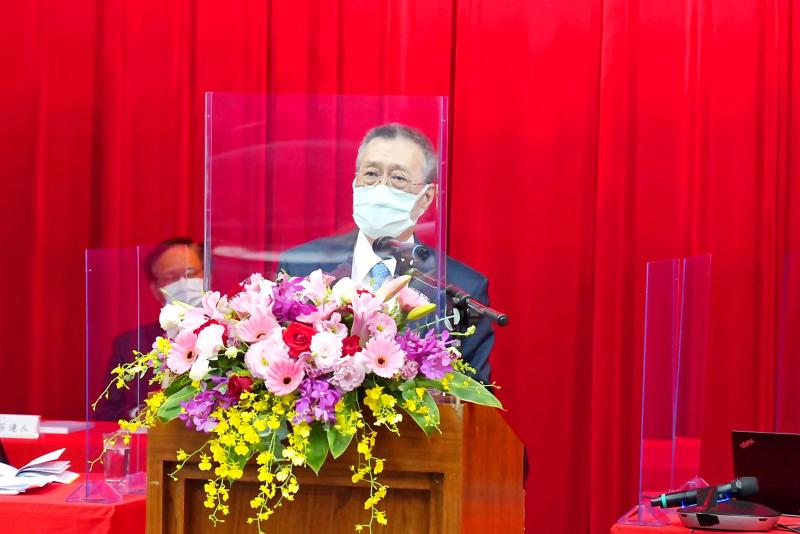Nanya Technology Corp (南亞科技) has received government grants to build a new NT$300 billion (US$10.17 billion) fab after a nine-month deferral primarily due to red tape, as well as shortages of labor and raw materials.
The chipmaker yesterday sent media an invitation to attend a groundbreaking ceremony for the 12-inch fab on June 23.
Nanya Technology expects the fab, to be built in New Taipei City’s Taishan District (泰山), to start commercial operations in 2025.

Photo courtesy of Nanya Technologies Corp
It had expected the fab to start operations in 2024 with a monthly capacity of 15,000 wafers.
The new factory would help Nanya Technology solve capacity bottlenecks, it said.
The chipmaker expects production this year to be little changed for a second year, after a 35 percent year-on-year expansion in 2020.
With the introduction of more advanced technologies, the new fab would help it broaden its product portfolio and expand its customer base, the company said when it unveiled the plans in April last year.
The firm yesterday said that it plans to ramp up production of its first-generation 10-nanometer process technology in the second half of this year, allowing it to offer an 8-gigabyte DDR4 DRAM, among other memory chips.
A second chip, a DDR5 DRAM, is entering pilot production using 10-nanometer technology, Nanya Technology chairman Wu Chia-chau (吳嘉昭) told the company’s annual shareholders’ meeting yesterday.
The 10-nanometer chips are expected to account for 10 percent of total output by the end of this year at the earliest, it said.
The company currently uses mostly 20-nanometer technology to make DRAM chips.
Cloud-based data centers are leading the uptrend in DRAM chip demand, while rising 5G smartphone penetration is also boosting consumption, Wu said, adding that commercial and gaming notebooks are also growth drivers.
However, rising inflation worldwide, geopolitical tensions and supply constraints for key components are dampening demand for consumer laptops and handsets, he added.
The firm’s shareholders at the meeting approved a cash dividend of NT$3.7 per common share, which represents about a 50 percent payout ratio compared with last year’s earnings per share of NT$7.4.

SELL-OFF: Investors expect tariff-driven volatility as the local boarse reopens today, while analysts say government support and solid fundamentals would steady sentiment Local investors are bracing for a sharp market downturn today as the nation’s financial markets resume trading following a two-day closure for national holidays before the weekend, with sentiment rattled by US President Donald Trump’s sweeping tariff announcement. Trump’s unveiling of new “reciprocal tariffs” on Wednesday triggered a sell-off in global markets, with the FTSE Taiwan Index Futures — a benchmark for Taiwanese equities traded in Singapore — tumbling 9.2 percent over the past two sessions. Meanwhile, the American depositary receipts (ADRs) of Taiwan Semiconductor Manufacturing Co (TSMC, 台積電), the most heavily weighted stock on the TAIEX, plunged 13.8 percent in

A wave of stop-loss selling and panic selling hit Taiwan's stock market at its opening today, with the weighted index plunging 2,086 points — a drop of more than 9.7 percent — marking the largest intraday point and percentage loss on record. The index bottomed out at 19,212.02, while futures were locked limit-down, with more than 1,000 stocks hitting their daily drop limit. Three heavyweight stocks — Taiwan Semiconductor Manufacturing Co (TSMC, 台積電), Hon Hai Precision Industry Co (Foxconn, 鴻海精密) and MediaTek (聯發科) — hit their limit-down prices as soon as the market opened, falling to NT$848 (US$25.54), NT$138.5 and NT$1,295 respectively. TSMC's

TARIFFS: The global ‘panic atmosphere remains strong,’ and foreign investors have continued to sell their holdings since the start of the year, the Ministry of Finance said The government yesterday authorized the activation of its NT$500 billion (US$15.15 billion) National Stabilization Fund (NSF) to prop up the local stock market after two days of sharp falls in reaction to US President Donald Trump’s new import tariffs. The Ministry of Finance said in a statement after the market close that the steering committee of the fund had been given the go-ahead to intervene in the market to bolster Taiwanese shares in a time of crisis. The fund has been authorized to use its assets “to carry out market stabilization tasks as appropriate to maintain the stability of Taiwan’s

In a small town in Paraguay, a showdown is brewing between traditional producers of yerba mate, a bitter herbal tea popular across South America, and miners of a shinier treasure: gold. A rush for the precious metal is pitting mate growers and indigenous groups against the expanding operations of small-scale miners who, until recently, were their neighbors, not nemeses. “They [the miners] have destroyed everything... The canals, springs, swamps,” said Vidal Britez, president of the Yerba Mate Producers’ Association of the town of Paso Yobai, about 210km east of capital Asuncion. “You can see the pollution from the dead fish.